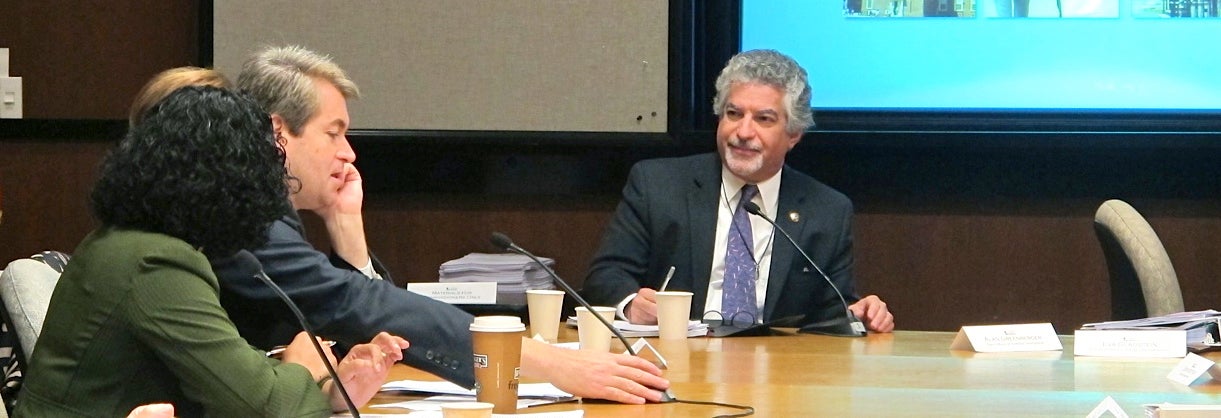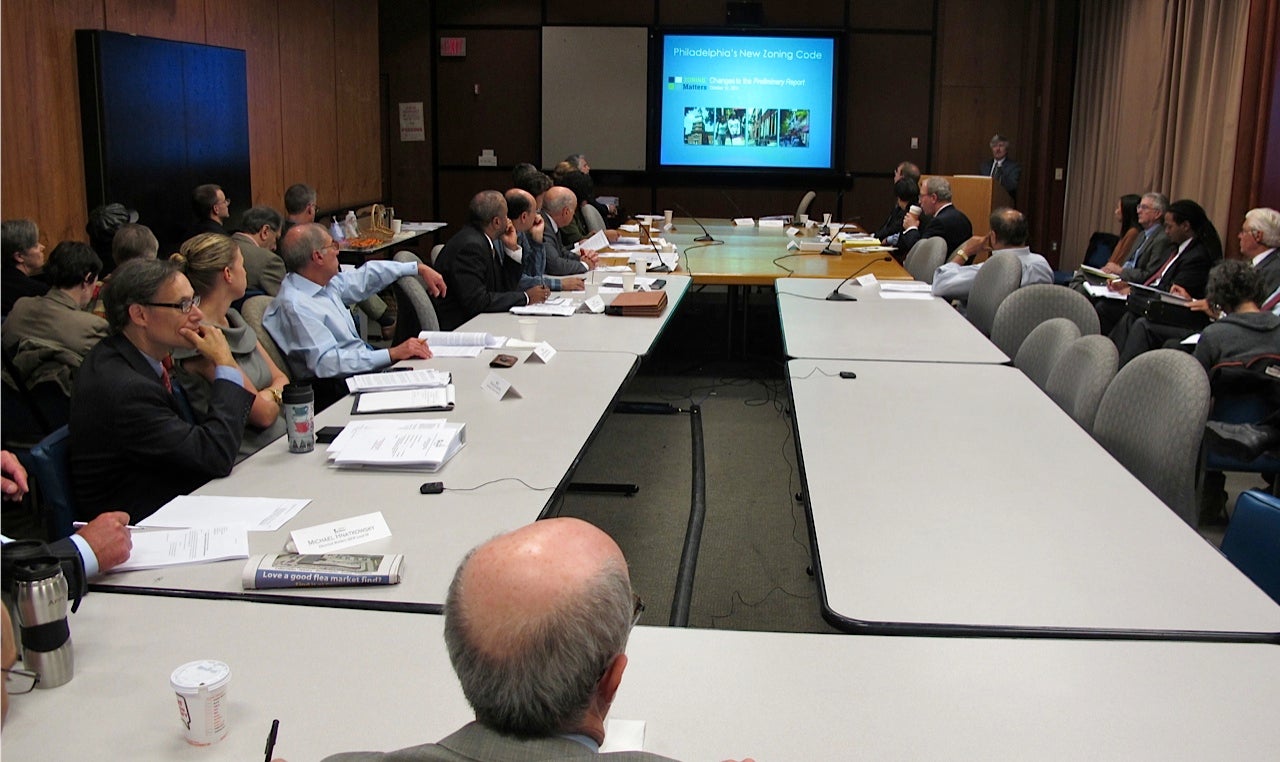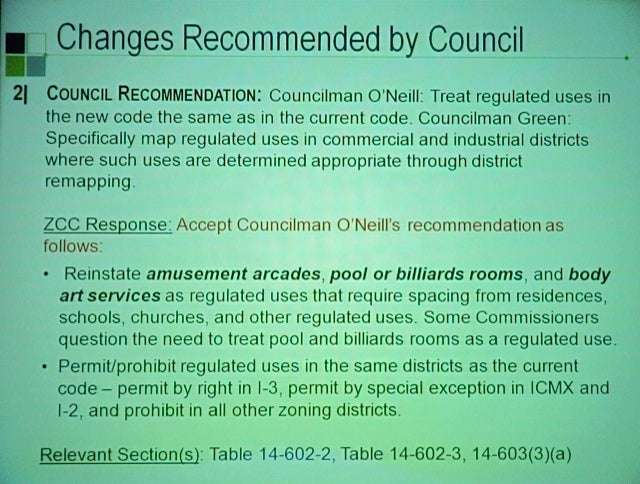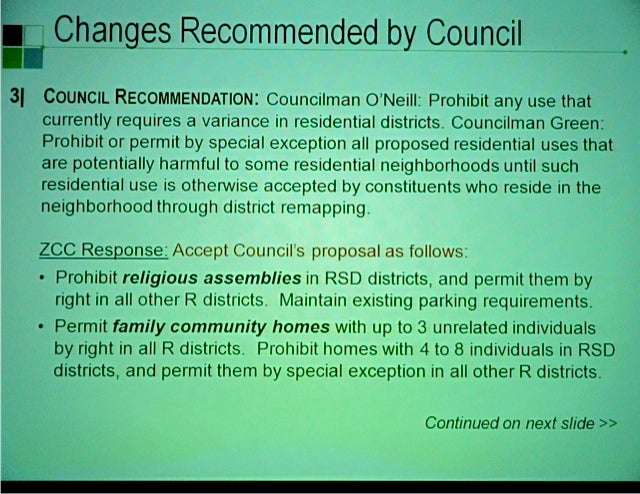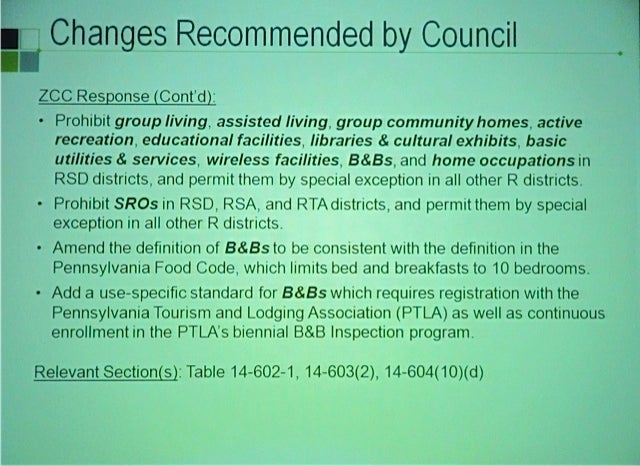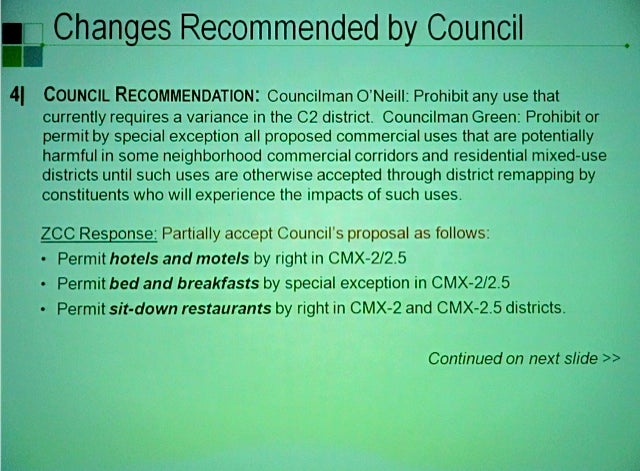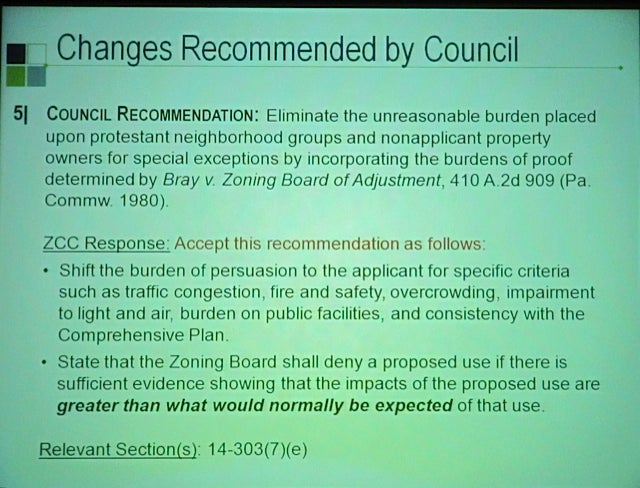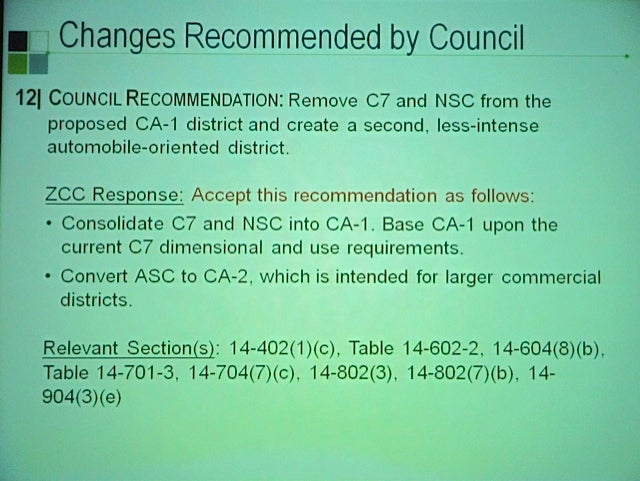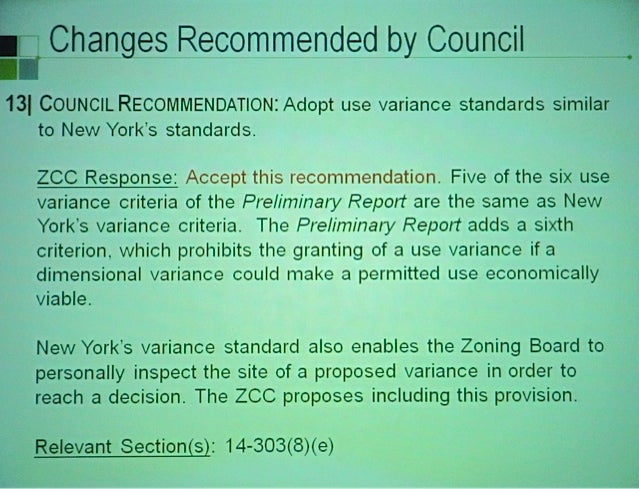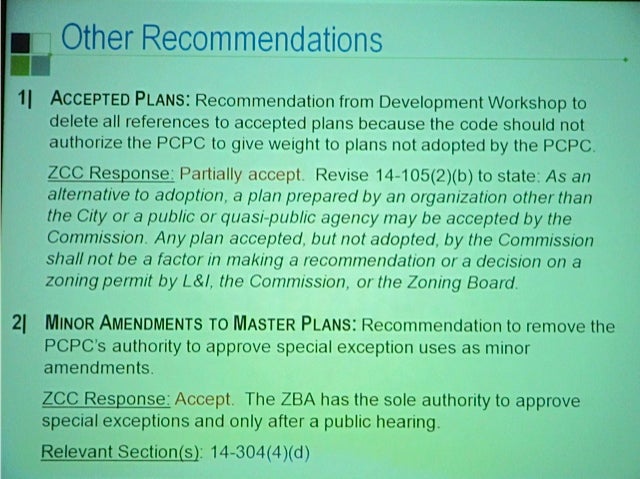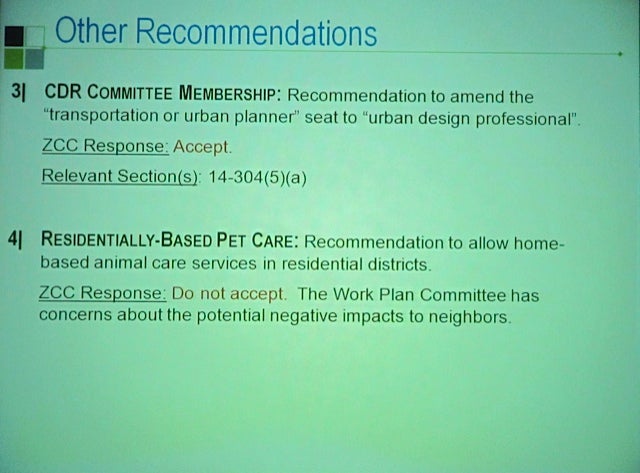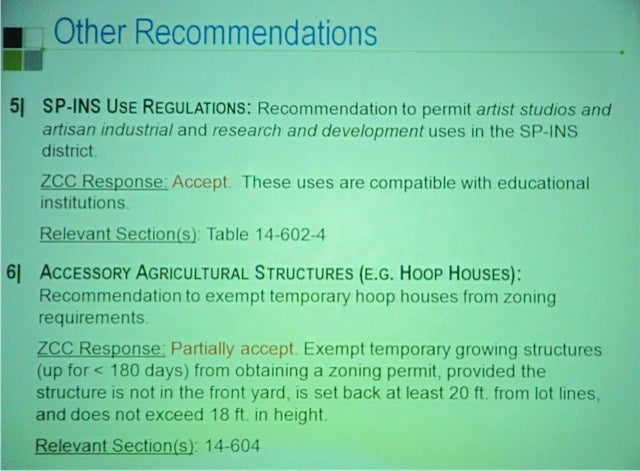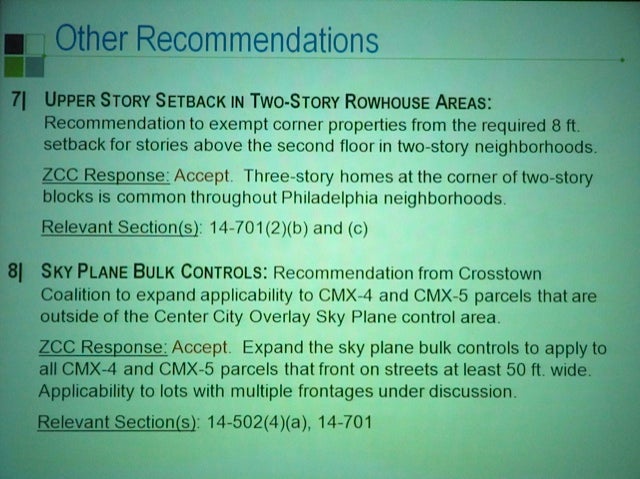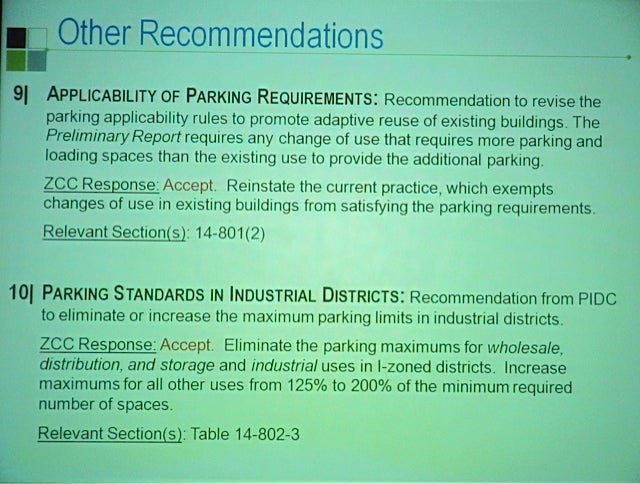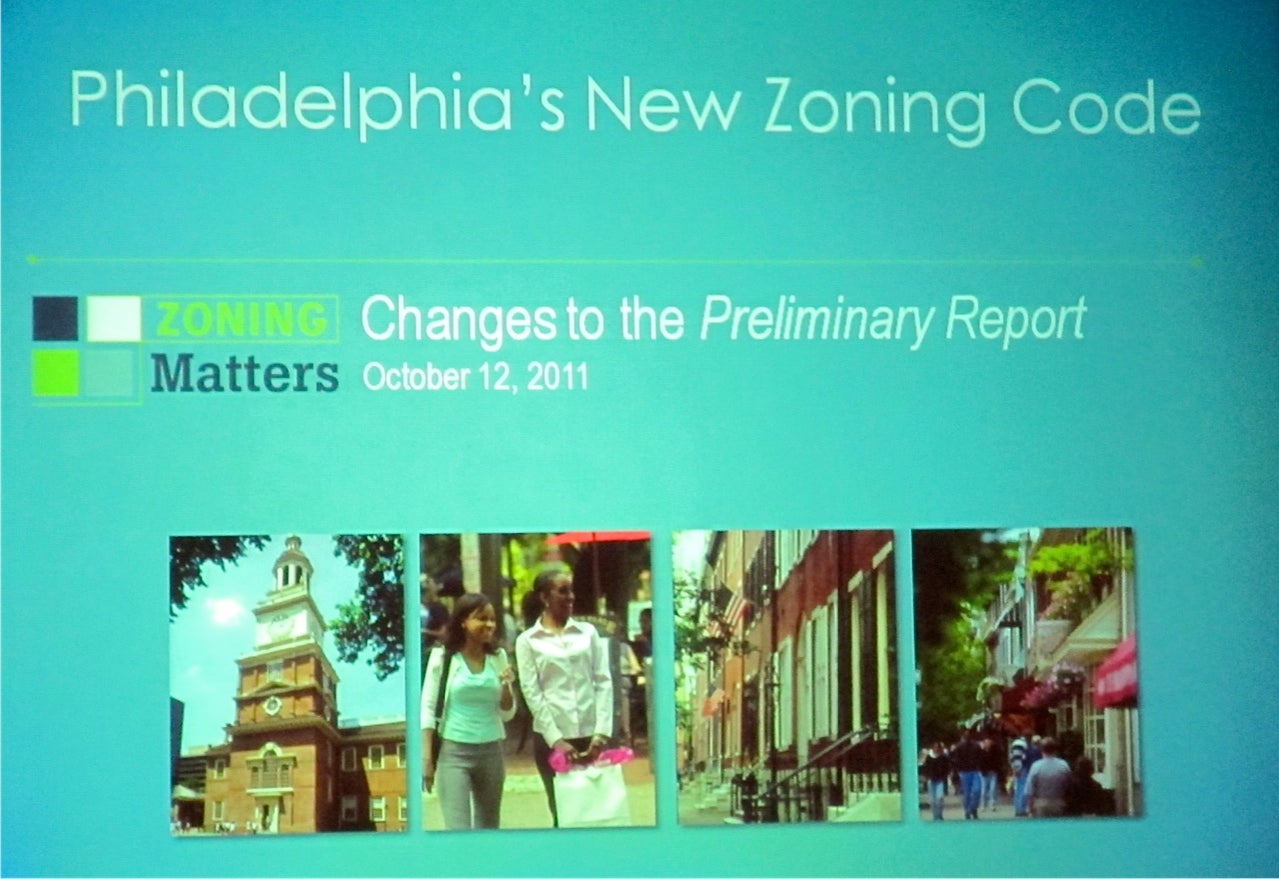A new zoning code is going to happen … if we can agree on methadone, sky plane … council prerogative
When Deputy Mayor Alan Greenberger called the meeting to order, about ten minutes after 8 a.m. Wednesday morning, not enough commissioners were present to adopt minutes from previous ZCC meetings, the last of which was held in June.
More filed in as the meeting progressed, and the Commission adopted those minutes just before adjourning the meeting around ten o’clock.
In the two-hour interim, the Commission reviewed proposed changes to its preliminary report and took some eleventh-hour comments from concerned stakeholders.
Greenberger said the ZCC hopes to receive official recommendations from Council by October 20th, and to send its Final Report back to Council on either November 3rd or November 17th. He said that while “no commitments have been made,” he believes Council will pass a new code before its current session ends December 15th. “We are truly getting close to the end of the work of this commission,” Greenberger said. “We hope.”
Eva Gladstein, executive director of the ZCC, notified Commissioners that some information related to sign controls has been posted on the ZCC website, and reminded them that the next Commission meeting will be held either October 26th or November 9th, depending on when Council sends back its recommendations.
She also said that the record of public testimony taken during Council’s hearings on the zoning proposals is available online for commissioners’ perusal.
The bulk of Wednesday’s meeting was dedicated to a presentation by land-use consultant Don Elliott, of Clarion Associates. Elliott reviewed 15 recommendations made by Council and ten recommendations from other groups, and described the ZCC’s proposed response to each.
The Commission’s responses to Council’s recommendations were first described in a document submitted to Council at its last public hearing on the zoning proposals, on Sept. 27th. The ZCC has elected to wholly or partially accept a majority of those recommendations and to reject only a few.
Among the rejected recommendations is a proposal introduced by At-Large Councilman Bill Green to eliminate methadone clinics from a larger subcategory of medical uses, and regulate them separately. The ZCC responded that it would be illegal to regulate methadone clinics differently than other medical offices.
After the meeting, Green told PlanPhilly that the methadone clinic issue will be a major obstacle in Council if it’s not changed before the Commission submits its final report. He said he would continue to push the issue, along with the rest of his recommendations, because he wants the final report to pass through Council without major hurdles.
“You can tell my colleagues to stuff it,” Green said, “but I don’t know where that gets us.”
Brenda Flock, a representative of NorthEast Treatment Centers, spoke in favor of keeping methadone clinics in the same category as other types of medical uses. She said that what Green had proposed is a violation of federal law and, moreover, harmful to addicts who need help. “There are people in this city,” Flock said, “clamoring for treatment for addiction to heroin.”
She added, “The recommendation of this Commission to reject the recommendation of Council is absolutely correct.”
Another item that generated discussion after Elliott’s presentation is the issue of Community Benefits Agreements and whether there should be a requirement to submit them to the Zoning Board of Adjustment.
In his ten-recommendation memo, Councilman Green suggested that mandatory submission requirements be removed from the draft. He said that having such documents on the record would put the City in a position of having to enforce them. Though the ZCC has consistently maintained that the City would never have to enforce such third-party agreements, it elected to accept Green’s recommendation and remove the requirement and penalties associated with noncompliance.
Several people who were at the meeting think that’s a bad idea. Craig Melidosian of Southwest CDC, Kiki Bolender of Schade and Bolender Architects, and all-around zoning enthusiast Bryan McHale all spoke in favor of having a disclosure requirement for CBAs.
McHale pointed out that members of Registered Community Organizations sit on Civic Design Review committees, and that in order to prevent any conflict of interest, they should be required to reveal any secondary agreements their groups may have made with developers.
Don Elliott, who helps craft land-use documents for cities throughout the United States, said that he has never written a mandatory submission provision outside Philadelphia. He said that disclosure was important, but that it could be assured without being written into the code. Elliott said the ZBA could simply ask RCOs and developers at their hearings whether they’ve entered into a Community Benefits Agreement.
The ZCC also elected to partially accept a recommendation from the Development Workshop which would delete from the code all references to “accepted plans,” and only allow plans officially “adopted” by the Planning Commission to factor into decisions by L&I and the Zoning Board.
Craig Schelter, who represents the Development Workshop, commended the Commission for that decision.
Sam Little, of Logan Square Neighborhood Association, opposes that decision. He encouraged the ZCC not to “discount the legal value of neighborhood plans,” and said that removing references to accepted plans would be a disincentive for neighborhoods to work on planning with the City Planning Commission.
Schelter objected to another of the ZCC’s decisions that would change the language of section 14-304(5)(a) of the code, which deals with Civic Design Review Committee membership. The Commission elected to amend the committee seat currently reserved for a “transportation or urban planner” so that it would be reserved for an “urban design professional.”
After the meeting, Schelter told PlanPhilly that while this recommendation sounds innocuous, it is anything but. “Urban design professionals,” Schelter said, “are mainly concerned with whether things are pretty.”
Schelter was also vocal about the ZCC’s decision to accept a recommendation from Crosstown Coalition which would expand Sky Plane Controls to CMX-4 and CMX-5 districts outside of the Center City Overlay Sky Plane control area.
In a recent interview with PlanPhilly, Schelter made it clear that he thinks Sky Plane controls are inappropriate, and he repeated that view at Wednesday’s ZCC meeting. “The only people investing money [in Philadelphia] are against Sky Plane controls,” Schelter said.
Councilman Green suggested that developers should be allowed to choose whether to follow the Sky Plane Control standards or the design standards in place under the current code.
Green, who was the only member of City Council to attend Wednesday’s meeting, urged the Commission to adopt each one of Council’s recommendations, including the ones it had already opted to reject. He wants the ZCC to include all of Council’s recommendations in its final report, and come back to issues that need attention after the code is passed. “I’d like people to think about separating out the things that don’t really matter in the big picture … so that we can move forward with a basically brand new code,” Green said.
Contact the reporter at jaredbrey@gmail.com
WHYY is your source for fact-based, in-depth journalism and information. As a nonprofit organization, we rely on financial support from readers like you. Please give today.



